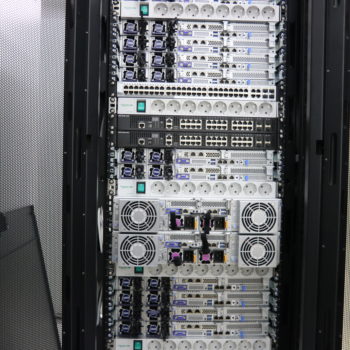Super computing for materials chemistry
At IQTCUB the research focuses on several aspects.
First, the development of computational methods and tools.
Then, various electronic structure and simulation techniques are applied to problems in materials science.
In addition, the reactivity and dynamics of chemical reactions are studied.
Simulation and discovery of advanced materials
Currently, after collaboration with SIE, the institute's more than 100 researchers have an impressive overall computing power.
This allows them to do research in various fields of theoretical and computational chemistry.
Also, with the expansion of the cluster, the institute is opening up to new fields of research.
We look forward to seeing more amazing discoveries in the future.
Press Releases
The IQTC approached Sistemas Informáticos Europeos (SIE), a Spanish company specializing in servers, workstations, and other network and communications systems. After many rounds of discussions, SIE boiled the client’s needs down to three key points…
D-Link, together with its partner SIE (Sistemas Informáticos Europeos), have collaborated in the launch of the new computational cluster of the Institute of Theoretical and Computational Chemistry of the University of Barcelona (IQTCUB)
The University of Barcelona supports its 10G network with D-Link switches. SIE installs this equipment in the Computational Chemistry cluster of the teaching center.
D-Link integrates high performance Switches for the 10 Gigabit network of the new Computational Chemistry Cluster of the University of Barcelona
D-Link has provided the 10 Gigabit Managed Switches for the fiber access network infrastructure to the new computing cluster of the Institute of Theoretical and Computational Chemistry of the University of Barcelona (IQTCUB).
Collaborators of this project
AMD ROME COMPUTE NODES FOR COMPUTATIONAL CHEMISTRY
New Installation at the University of Barcelona
At the beginning of July, SIE installed new nodes for the Computational Chemistry cluster in the University of Barcelona. This acquisition was obtained in a contest of almost 360,000 euros.
Node Characteristics
through 26 nodes SIE Ladonbased on platforms Gigabyte and processors AMD Rome, a total of 1,664 2.9 Ghz cores and 26 TB of RAM are offered to the customer for scientific calculations.
The nodes are integrated through a network 10G, connected to fiber with the outside world and a gigabit network for communications IPMI, through switches DLINK, allowing remote control of machines with KVM over LAN and via free app GSM (Gigabyte Server Management).
Institute for Computational Chemistry
In turn, the Institute for Computational Chemistry specializes in various fields of theoretical and computational chemistry.
At the IQTCUB, the research activity is vast and diverse. It begins with the development of computational methods and tools.
Next, various electronic structure and simulation techniques are used. These techniques are applied to challenges in materials science and are used to study the reactivity and dynamics of chemical reactions.
In addition, the research also encompasses biological systems and soft matter.
More Calculation Power
According to the administrator Jordi Inglés, more than 100 researchers work with the HPC system at the center with a global computing power of almost 4000 cores and 37TB of RAM.
Now, by adding the new SIE cluster, we have considerably increased the computing power of the center.
Expansion and New Research Areas
Currently, thanks to the María de Maeztu award, the institute is expanding.
Currently, it covers research fields such as molecular dynamics, artificial intelligence and machine learning.
In addition, the design and 3D printing of molecular structures is being explored, as well as the interaction with virtual environments using Oculus glasses.


















